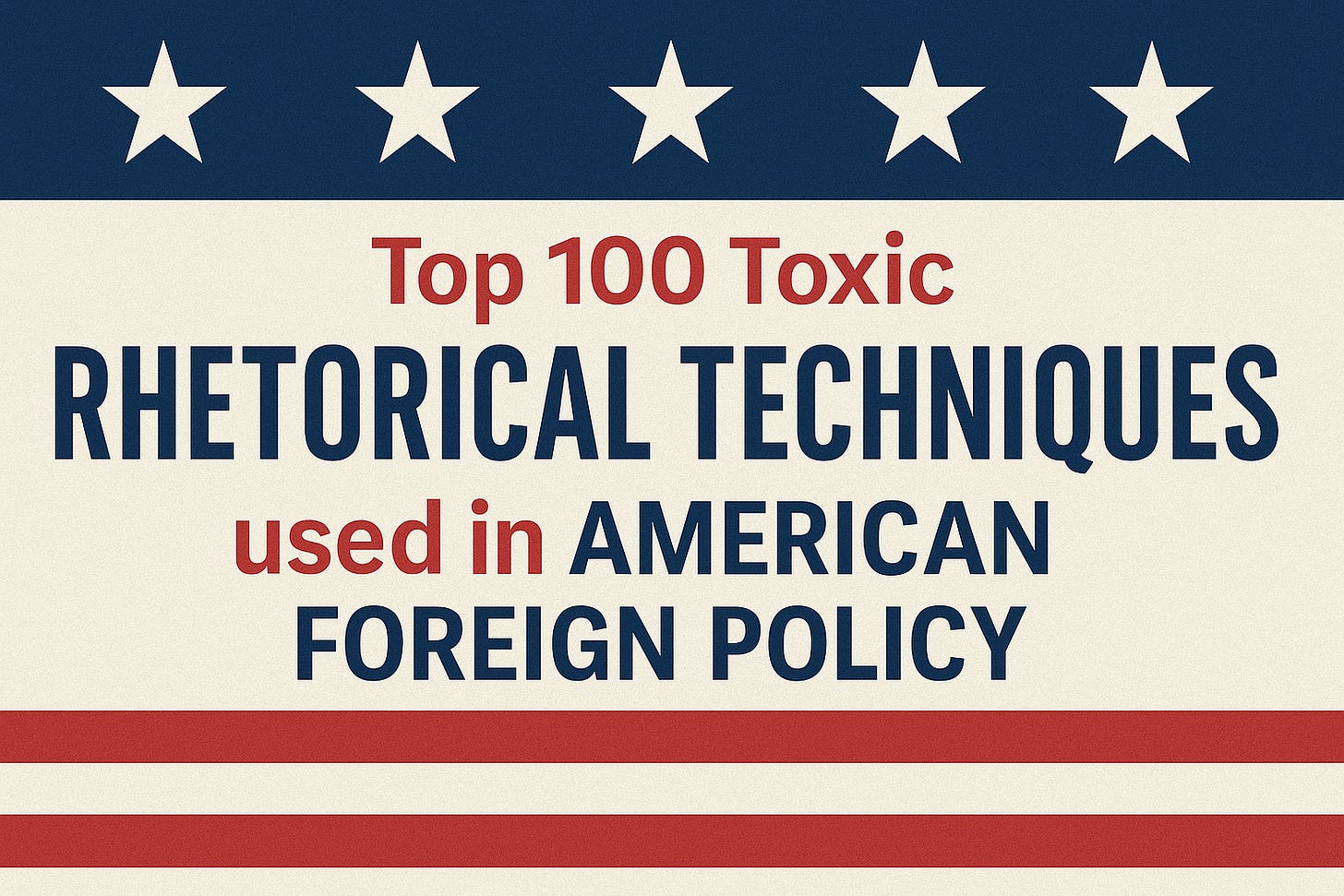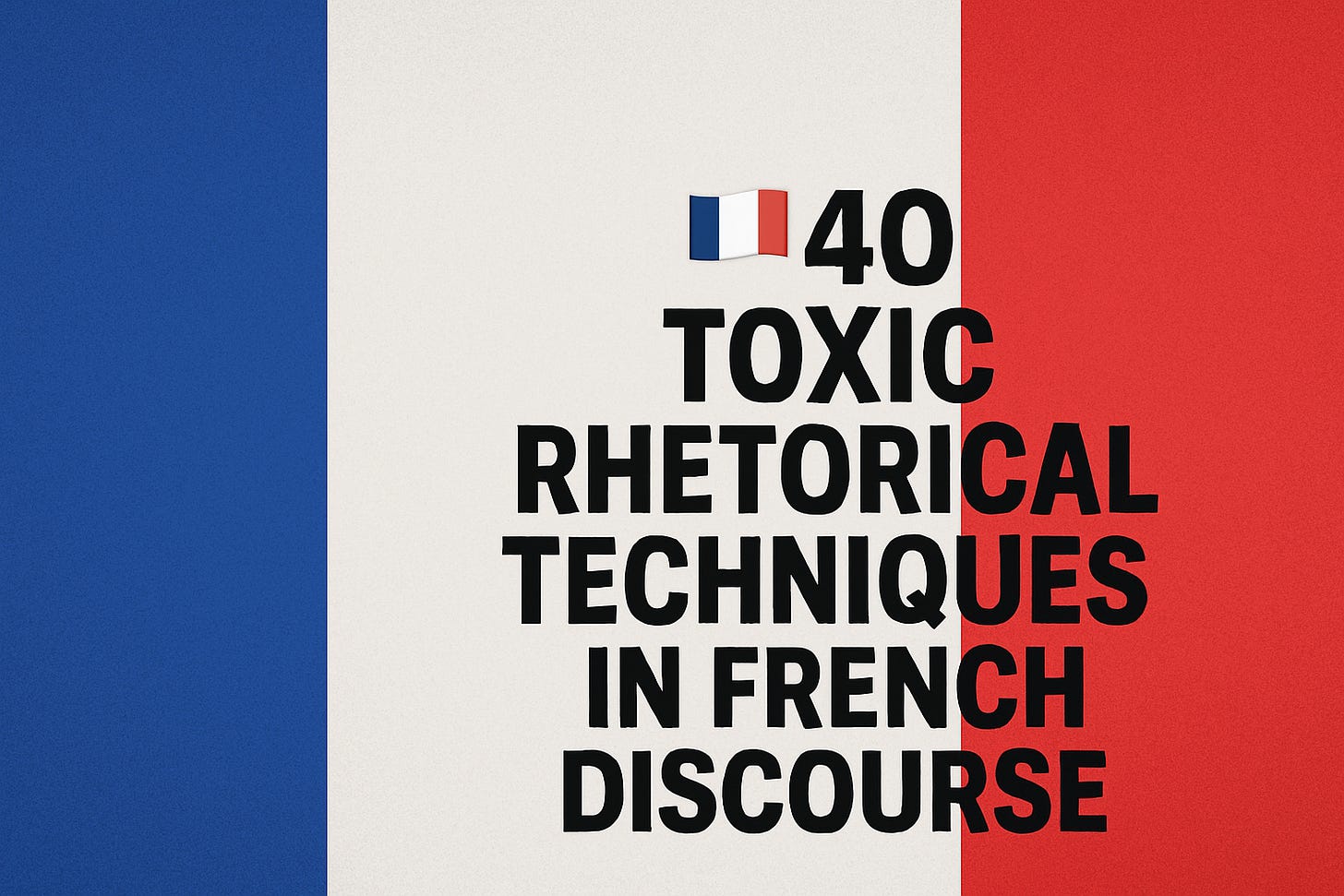29 Top Japanese Toxic Rhetorical Techniques
Chat GPT analyzes the rhetorical techniques that "critics" might consider "toxic"
This is a continuation of my research using AI to unmask rhetoric and systems.
Note: There are only 29 results here because I had difficulty getting ChatGTP to provide more.
ChatGTP Prompt:
Q: What rhetorical techniques does China use that some consider “toxic”?
Categories:
RESULTS:
Category 1: Historical Manipulation
Historical Revisionism
Definition: Reinterpreting or downplaying historical events, especially wartime atrocities, to present a more favorable national image.
Effect: Distorts historical understanding, limits reconciliation, and perpetuates grievances with neighboring countries.
Why It’s Toxic: Minimizes the experiences of victims of Japan's wartime actions, hindering healing and reconciliation.
Selective Memory on WWII Atrocities
Definition: Emphasizing Japan’s victimization during WWII while downplaying its role in atrocities such as the Nanjing Massacre or the use of comfort women.
Effect: Creates a lopsided historical narrative, fostering resentment and stifling reconciliation with affected countries.
Why It’s Toxic: Prevents real accountability for Japan's wartime actions and undermines efforts for diplomatic reconciliation.
Sanitized National History
Definition: Focusing heavily on Japan’s cultural achievements and post-war recovery, while downplaying its wartime aggression or colonial history.
Effect: Promotes a version of history that is palatable to national pride but disregards the harm caused by Japan's past actions.
Why It’s Toxic: Hinders true reconciliation and critical reflection on Japan's history, especially in relations with its neighbors.
Historical Amnesia
Definition: Failing to acknowledge Japan’s wartime aggression or historical wrongs in public discourse.
Effect: Prevents necessary conversations about the impact of Japan’s past actions, especially in relations with neighboring countries.
Why It’s Toxic: Undermines efforts for reconciliation and mutual understanding, perpetuating historical grievances.
Category 2: National Identity & Social Issues
Monolithic National Identity
Definition: Portraying Japan as a homogenous society with a single, unified national identity, dismissing the existence of cultural or ethnic diversity.
Effect: Marginalizes minority groups, such as ethnic Koreans, Ainu, or Okinawans, and reinforces exclusionary policies.
Why It’s Toxic: Promotes an “us vs. them” mentality, leading to the marginalization of non-Japanese and minority populations.
Overemphasis on Homogeneity as a National Strength
Definition: Presenting Japan’s homogeneity as a unique strength, often dismissing or minimizing the benefits of ethnic diversity and multiculturalism.
Effect: Excludes and marginalizes minority voices and creates barriers to more inclusive social policies.
Why It’s Toxic: Leads to exclusionary practices and discrimination against non-Japanese and minority groups, reinforcing societal divisions.
Cultural Gatekeeping
Definition: Defining Japan's culture in a way that excludes non-Japanese influences or traditions, often to maintain national purity or exclusivity.
Effect: Reinforces an insular national identity and rejects cultural exchanges that could enrich society.
Why It’s Toxic: Fosters xenophobia, limits diversity, and discourages global cultural collaboration.
Victimhood Framing
Definition: Emphasizing Japan’s suffering during WWII, particularly the atomic bombings, as a way to garner global sympathy or excuse certain policies.
Effect: Fosters an emotional connection with the international community but can overshadow Japan’s role in the broader context of wartime aggression.
Why It’s Toxic: Reduces a complex historical narrative to one of singular victimhood, ignoring the impact of Japan’s own wartime actions.
Homogenization of Japanese Identity in Foreign Policy
Definition: Portraying Japan as a single, unified nation-state without acknowledging its internal divisions (e.g., Okinawan independence movements).
Effect: Conceals internal challenges, such as regional disparities or autonomy movements, under a singular, nationalistic identity.
Why It’s Toxic: Suppresses regional diversity and dissent, reinforcing a top-down approach to both domestic and foreign policy.
Resistant Cultural Nationalism
Definition: Using resistance to foreign cultural influence as a rallying cry for preserving Japanese identity and cultural purity.
Effect: Fosters division between Japan and the global community, discouraging cultural exchange and innovation.
Why It’s Toxic: Limits Japan's engagement with global cultures, undermining international cooperation and understanding.
Category 3: Foreign Policy & Diplomatic Manipulation
Framing Japan as a Global Mediator
Definition: Presenting Japan as a neutral or peace-oriented global mediator, despite Japan's role in regional security conflicts or alliances.
Effect: Distorts Japan’s actual geopolitical stance and positions it as a benevolent actor on the global stage.
Why It’s Toxic: Oversimplifies Japan's role in international conflicts, presenting it as above the fray while concealing its political alignments.
Downplaying Territorial Disputes
Definition: Minimizing the significance of territorial disputes, particularly over the Senkaku Islands and the Kuril Islands, in international rhetoric.
Effect: Avoids addressing contentious issues that could lead to further diplomatic tensions with China and Russia.
Why It’s Toxic: Creates an image of Japan as a peace-loving nation, while avoiding real engagement with territorial conflicts.
Shifting Blame (Passing the Buck)
Definition: Redirecting blame for national issues, such as economic crises or environmental damage, onto other countries or external factors rather than addressing internal problems.
Effect: Erodes accountability and responsibility, avoiding real systemic change.
Why It’s Toxic: Prevents national reflection and reform, undermining transparency and progress.
Soft Power Manipulation
Definition: Using Japan’s cultural exports (anime, technology, pop culture) to subtly influence international politics and improve Japan’s diplomatic image.
Effect: Undermines genuine diplomatic engagement by using cultural appeal as a way to shape political narratives.
Why It’s Toxic: Turns cultural diplomacy into a tool for national self-interest, promoting superficial engagement over substantive political dialogue.
Framing of Japan as an Environmental Leader
Definition: Presenting Japan as a global environmental leader, particularly through initiatives like climate change policy or clean energy, while downplaying significant environmental issues at home.
Effect: Builds a positive global reputation while deflecting attention from domestic pollution and unsustainable practices.
Why It’s Toxic: Creates a false narrative that Japan is environmentally responsible while critical domestic issues remain unaddressed.
Appeal to Technology as a Moral Imperative
Definition: Suggesting that technological progress (e.g., robotics, AI) is an ethical obligation that transcends social or political considerations.
Effect: Shifts focus away from the social and ethical implications of technology, emphasizing economic benefits and national prestige.
Why It’s Toxic: Downplays the risks and moral considerations surrounding technological advancement, such as job displacement or surveillance concerns.
Weaponized Pacifism
Definition: Using Japan’s pacifist constitution and post-WWII identity to avoid meaningful military engagement while still participating in security arrangements with allies.
Effect: Allows Japan to bypass international obligations under the guise of pacifism, while still engaging in military alliances or interventions.
Why It’s Toxic: Manipulates international expectations and confuses Japan’s true foreign policy posture, often leading to mistrust among neighbors.
Category 4: Economic & Social Manipulation
Economic Triumph
Definition: Focusing on Japan’s technological and economic success while neglecting growing social issues like elderly poverty, mental health, and labor exploitation.
Effect: Paints a picture of a thriving nation while ignoring deep-seated inequalities and social issues that affect vulnerable populations.
Why It’s Toxic: Distracts from pressing social issues that need urgent attention and avoids necessary systemic reform.
Greenwashing
Definition: Presenting Japan as an environmental leader while failing to address significant domestic ecological issues like nuclear waste and industrial pollution.
Effect: Builds an image of environmental responsibility while concealing real environmental harm.
Why It’s Toxic: Creates a false narrative about Japan’s commitment to sustainability and undermines global efforts for genuine environmental reform.
Technological Optimism
Definition: Prioritizing technological or scientific advancements in political rhetoric, while downplaying social issues like inequality or environmental degradation.
Effect: Focuses on economic or technological progress at the expense of addressing social inequalities and environmental concerns.
Why It’s Toxic: Promotes a superficial narrative of success without addressing deeper systemic problems or inequalities.
Selective Victimhood
Definition: Emphasizing Japan’s victimization during WWII, particularly the atomic bombings, as a way to garner sympathy or moral high ground in international negotiations.
Effect: Diverts attention from Japan’s historical role in the war, focusing instead on the devastation it suffered.
Why It’s Toxic: Reduces a complex historical narrative to one of singular victimhood, ignoring the impact of Japan’s own wartime actions.
Category 5: Cultural & Political Rhetoric
Appeal to National Pride
Definition: Using Japan’s cultural achievements and past successes as a means to foster national pride and unity.
Effect: Encourages nationalism and reinforces a sense of superiority while downplaying flaws or contradictions in national history.
Why It’s Toxic: Leads to an exclusionary mindset, where dissenting views or criticisms are dismissed as unpatriotic.
Cultural Hegemony
Definition: Using Japan’s technological advancements and cultural exports to subtly dominate or influence other countries.
Effect: Positions Japan’s culture as the global standard, undermining local cultures and diversity.
Why It’s Toxic: Diminishes the richness of other cultures and fosters a sense of cultural superiority.
Selective Engagement in Global Issues
Definition: Choosing to engage in certain international issues while avoiding others that might be more politically or economically sensitive.
Effect: Creates the illusion of global engagement while selectively picking causes that align with national interests.
Why It’s Toxic: Manipulates global perceptions of Japan’s diplomatic priorities and suppresses international discussions on more contentious issues.
Category 6: Foreign Policy & Security
Strategic Pacifism
Definition: Using Japan’s pacifist constitution and identity to avoid taking responsibility in international conflicts while still engaging in defense alliances.
Effect: Presents Japan as a pacifist actor, but allows it to engage militarily in a limited manner through alliances.
Why It’s Toxic: Manipulates the perception of Japan’s military role in the world, avoiding full transparency about its security policy.
Technocratic Narratives
Definition: Framing crisis management in terms of technical solutions (e.g., expert committees, technological fixes) while downplaying social or political implications.
Effect: Creates the illusion of control and progress, without addressing the broader, systemic issues.
Why It’s Toxic: Hides the need for systemic political reform and prevents inclusive, grassroots solutions from being prioritized.
Category 7: Military & Defense
Strategic Ambiguity
Definition: Maintaining ambiguity about Japan’s defense and military alliances to preserve flexibility in foreign policy while avoiding direct confrontation.
Effect: Allows Japan to navigate complex international diplomacy without making firm commitments, maintaining a stance of neutrality.
Why It’s Toxic: Confuses international partners and adversaries, preventing clear expectations about Japan’s role in regional security.
Economic Diplomacy
Definition: Using economic aid and trade as a tool to strengthen political alliances and expand Japan’s influence globally.
Effect: Ensures Japan’s economic interests are promoted under the guise of altruistic aid, masking self-serving motives.
Why It’s Toxic: Undermines the integrity of international aid efforts by using them as leverage for national gain.
Category 8: Human Rights & Justice
Humanitarian Crisis Denial
Definition: Downplaying or denying the severity of humanitarian crises involving Japan’s neighbors, particularly in North Korea or Myanmar, to avoid diplomatic pressure.
Effect: Hinders global efforts to address humanitarian issues, positioning Japan as uninvolved or unaffected.
Why It’s Toxic: Allows Japan to maintain political neutrality or avoid criticism while ignoring human rights abuses that require international intervention.
Related Posts:
Top 100 Toxic American Rhetorical Techniques used in American Foreign Policy
Top 40 Toxic British Rhetorical Techniques used in American Foreign Policy
Top 40 Toxic French Rhetorical Techniques used in American Foreign Policy







